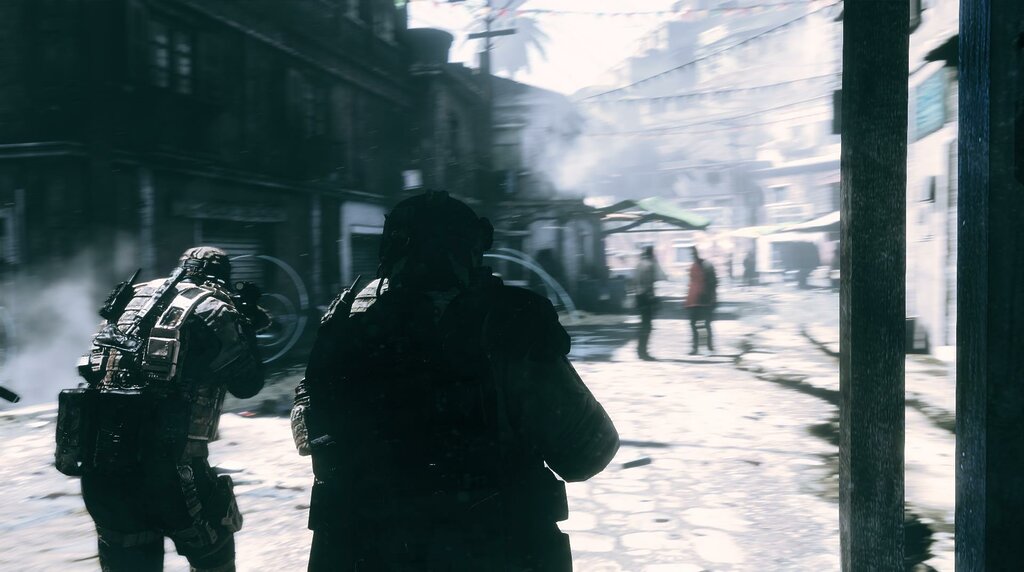- The once-renowned Ghost Recon series lost its identity after Ubisoft implemented its repetitive open-world mechanics into the new entries.
- Recent releases have been reviewed poorly due to this forced shift to open-world gameplay.
- Many fans, including myself, long for the series’ return to its tactical roots.
It’s no surprise that Ubisoft’s quality has deteriorated in recent years. Its mainline franchises fell victim to generic releases, resulting in various financial problems.
Ubisoft has canceled nearly eight titles over two years and decided only to focus on its magnum opus, Assassin’s Creed. This leaves the Tom Clancy’s games in a difficult position.
Because the studio now relies on an open-world formula, I prefer the older Ghost Recon games. Those delivered exactly what I wanted from a military tactical shooter: a healthy balance between the tactical and linear approach with variety in a single mission.
Unfortunately, the last Ghost Recon with gameplay like that was Future Soldier, released over a decade ago in 2011. Imagine a new Ghost Recon game with the same old approach combined with the power from the latest hardware; I’m already sold.
Why it matters: The Ghost Recon games, regarded as some of the best military tactical shooters in the early 2000s, fell off mainly due to Ubisoft linking its open-world formula to every game.
Stuck In The Past

Ubisoft’s approach wasn’t always this boring. It pioneered some of the best open-world video games in the 2010s. Far Cry 3 and Assassin’s Creed IV Black Flag are just a few names that come to mind.
However, the problem with Ubisoft was its desperation to replicate the same success with new titles. The repetitive formula consists of liberating outposts and settlements with maps full of markers. If you’ve played Watch Dogs, The Division, or Assassin’s Creed, you’ll notice that every game plays similarly at its core.
This unnecessary addition adds bloat and makes the gameplay less interesting. The same happened with Ghost Recon: Breakpoint. With tons of microtransactions and Ubisoft experimenting with NFTs in-game, Breakpoint was bound to fail.
Apart from mechanics thrown together from other Ubisoft releases, Breakpoint’s gameplay was pretty solid, with precise gunplay, movement, and a tactical approach that added to the immersion.
However, the game suffered from a boring open world with the same old side missions. Ghost Recon Breakpoint was basically Ghost Recon Wildlands 2.0. Even with all the community feedback, the developers turned Breakpoint into a looter shooter, abandoning the IP’s whole identity.
Since it hadn’t already learned with Wildlands and Breakpoint, Ubisoft started working on a Ghost Recon battle royale that nobody asked for. At this point, I wouldn’t even bother calling it Ghost Recon. To nobody’s surprise, the project ended up being cancelled.
How A Linear Approach Can Work

The open-world fatigue in 2024 is real, especially for Ubisoft releases. Many, including me, don’t have hundreds of hours to invest in a game doing repetitive side quests and sometimes just looking for a quality experience.
Ghost Recon Future Soldier had the most potential out of any entry in the series. However, the experience was too linear. Still, Future Solider is, to date, one of the best team tactical shooters.
A bit of tweaking to the Future Soldier model can work for future titles. The addition of minor side objectives would also be beneficial. Despite being linear, the older entries still offered freedom to approach objectives.
Consider it a hybrid of the semi-open world approach and linear gameplay. Future Ghost Recon games should follow this format, integrating different regions to make the experience more diverse.
This would provide a more streamlined experience. I would compare it to the latest Hitman games for a rough reference. This was the tactical approach that Ghost Recon was famous for and built upon as an IP.
For me, the newer games have strayed too far away from this style despite Ghost Recon Wildlands being a decent game at its core.
After all, the more streamlined approach, in addition to the challenging gameplay, is what made Ghost Recon so successful. Ultimately, I want Ubisoft to address fan demands and satisfy our third for more tactical elements.
A new entry in the series is currently being worked on under the codename “Project Over.” Fortunately, leaks suggest Ubisoft is doing exactly what I want, with the team focusing on a back-to-basics approach.
Thank you! Please share your positive feedback. 🔋
How could we improve this post? Please Help us. 😔
[Staff Writer]
Shaheer is currently pursuing a Business degree while also working as a part-time Content Writer. With his deep passion for both writing and video games, he has seamlessly transitioned into a role as a Journalist. Over the past two years, Shaheer has contributed as a freelancer to various websites and landed positions on acclaimed platforms like Gamerant. Currently, his role at Tech4gamers is as a Features Writer, but he also covers News occasionally. Shaheer’s favorite gaming franchises are Assassin’s Creed and the God of War series.
Get In Touch: shaheerzahid03@gmail.com




